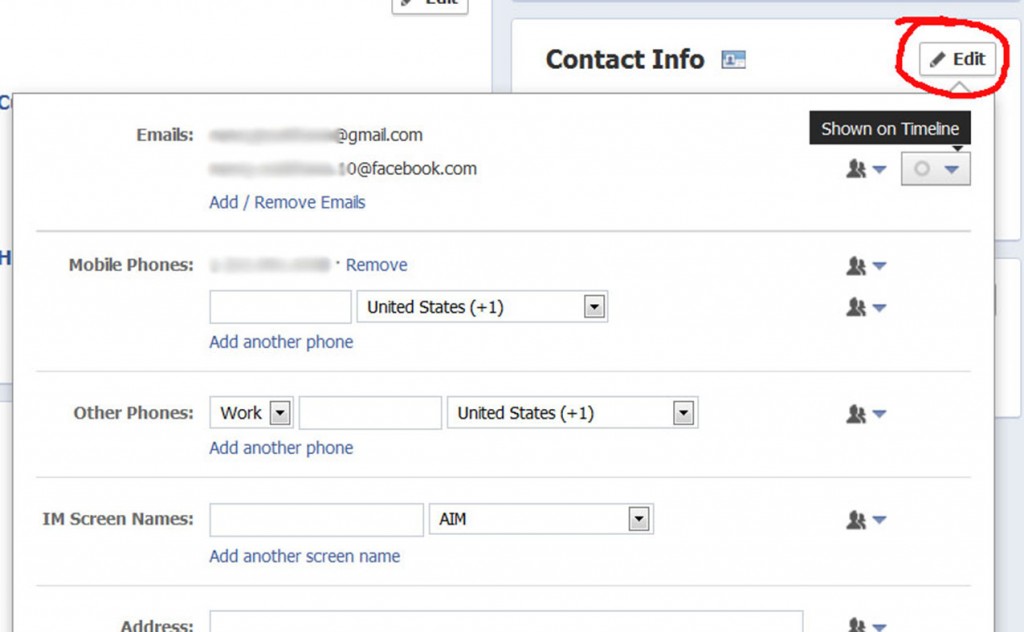Posts Tagged ‘ Internet Privacy ’
Keeping Your Private Parts Private Online
April 9th, 2013. By Hunter West
 There is little doubt the evolution of communication towards electronic or social platforms such as email, Facebook, LinkedIn and Twitter has effectively taken over our lives. Social networking, while great for reconnecting with long-lost friends or career networking, can also carry substantial risk–and often the fallout is nothing short of devastating.
There is little doubt the evolution of communication towards electronic or social platforms such as email, Facebook, LinkedIn and Twitter has effectively taken over our lives. Social networking, while great for reconnecting with long-lost friends or career networking, can also carry substantial risk–and often the fallout is nothing short of devastating.
While figures are not yet available for 2012, The Wall Street Journal (WSJ 3/15/12) reported last year that incidents of identity theft increased 13 percent in 2011 over the same period the year before. That translates to 12 million Americans.
What’s worse, it can take, on average some 30 hours and about $500 to resolve online identity fraud, according to TransUnion, a credit-reporting firm.
Think of it. 30 hours represents almost an entire week’s worth of lost productivity – so the financial costs can be even higher. And beyond examples of simple identity theft, are cases that are far more complex and damaging, for which legal representation is often necessary.
As our use of smart communications technology and social media increases, it’s useful to be aware of who is at risk for identity theft: 7 percent of smartphone owners were victims of identity theft in 2011, and are considered one-third more likely to fall prey to identity theft than the general population.
The reason, is that smartphones are actually mini-computers–but users tend not to protect their smartphones with passwords and other security features, as they would their PCs or laptops. According to a recent survey, 62 percent of smartphone users fail to use a password to access their home screen.
You might be surprised to know that according to a survey conducted by Javelin Strategy & Research, the business social network LinkedIn had the highest identity-theft rate at ten percent, vs. five percent for the general population. The rate for Google+ users was 7 percent, 6.3 percent for Twitter and 5.7 percent amongst users Facebook. Note that these figures are all about a year old and are probably much higher today. Facebook, says Javelin, is probably the lowest due to the availability and awareness of those much-maligned but highly effective privacy settings.
On the other end of the scale, LinkedIn is probably high because users perceive LinkedIn as a business platform and take fewer precautions, given an assumption you are connecting with like-minded business people rather than spammers, or worse.
And here is another sobering thought–you will recall that large security breaches involving Sony, Epsilon and RSA together with several government entities in 2011 represented a whopping 67 percent increase over the same period in 2010.
Ways you can protect yourself include keeping your antivirus software updated on all devices, the consistent use of strong passwords (featuring a mix of letters, numbers and symbols), and the use of different passwords for each account. And avoid storing personal information on a mobile device. All it takes is the laying down of your Blackberry or iPhone for a split second in a crowded venue and suddenly, it’s gone – with all your personal information along for the ride.
Even emails can get you in trouble, by inadvertently hitting ‘Reply all’ instead of just ‘reply.’ In so doing you may have sent sensitive, hurtful or even libelous information out to the masses.
There is little doubt that electronic communication and social networking are here to stay, as is the growing e-commerce. Protecting your identity is of paramount importance.
How to Get Outed on Facebook: Be Seen Here
August 27th, 2012. By AbiK
 How it hadn’t happened earlier is a mystery, but there’s a new website in town that’ll give even the snoopiest of insurance companies or HR departments a run for their money—heck, it might even be a new resource for them. The website is WeKnowWhatYoureDoing.com.
How it hadn’t happened earlier is a mystery, but there’s a new website in town that’ll give even the snoopiest of insurance companies or HR departments a run for their money—heck, it might even be a new resource for them. The website is WeKnowWhatYoureDoing.com.
And know they do.
Want to be outed for hating your boss and wanting to be fired? Stop by.
Want to be outed for being way the hell too hungover to show up for work? Click on over.
How ’bout being outed for taking drugs? Gotcha covered.
Oh, and you’re also outed on WeKnowWhatYoureDoing.com if you’ve got a new phone number. Nice to know.
The key here is that YOU do not have to actually sign up for the pleasure of being outed on Facebook—you merely have to post something (something rather stupid I might mention) and not be too up on your Facebook privacy settings, and—Voila!—you may well show up on the site.
You may be sitting there saying, “Gosh, isn’t that like some sort of internet privacy issue? Aren’t they doing something illegal?”
Well, not exactly.
A little unkind, perhaps—but YOU’VE put the post about your prior night’s transgressions out there publicly for everyone to access, right? Not smart.
Here’s an excerpt on what WeKnowWhatYoureDoing.com has to say about things:
How does it Work? It simply queries Facebook’s Graph API and outputs the results. There is nothing on this website that cannot be accessed by anyone else.
Note also the site’s disclaimer (to see full disclaimer, visit the site):
Disclaimer: All data is pulled directly from Facebook, it is not censored, and it is publicly accessible via the Graph API. I cannot be held responsible for any persons actions as a result of using this experiment. Absolutely no information from any of the data providers includes, but not limited to Facebook, Foursquare, Twitter, Yahoo, or Google is being collected or stored.
Hmm. Now may be a good time to head over to Facebook and make sure your privacy settings aren’t set to “Public”.
Oh, and WeKnowWhatYoureDoing.com even tells you how to do that:
Just go to https://www.facebook.com/settings/?tab=privacy and make sure Control Your Default Privacy is not set to “Public”. You can set it to “Friends” but for the best privacy it is recommended you choose “Custom” and go through each option to choose who can see what.
Got a Facebook Email you Don’t Want? Here’s How to Fix your FB Email…
June 26th, 2012. By AbiK
Facebook’s gotten an little cocky—inching up to those internet privacy boundaries. It seems to think I need—and WANT—an “@facebook” email domain (I do not). And, it’s worse than that—Mark Zuckerberg et al apparently think I want that “@facebook” email to be the one most folks see on my profile—even though I never access such an email account and don’t ever intend to.
Thanks, but no thanks, Facebook—I’ll choose whatever damn email I want.
If you’ve noticed that your email on your “About” section of your timeline has changed, unannounced, to something like this:
[your.name].10@fa
and you’re not happy, here’s what to do to…
Fix Your Facebook Email Address
1. Go to your Profile page on Facebook. (That’s the one you get when you click your name and tiny thumbnail image in the upper right corner of your screen).
2. Go to the “About” section of your Profile page. (The “About” link should be just under your profile pic on the left, midway down your screen).
3. Go to the “Contact Info” section on that page, and click the “Edit” box. You’ll see 2 emails (at least)–the one you wanted, and the one Facebook wants you to have. Hover your mouse over the drop down arrow that’s all the way over to the right. It’ll look like this:
4. Adjust the Email Setting to “Hidden from Timeline“, and adjust your real email to “Shown on Timeline”.
5. Optional, though not a bad idea, slightly to the left on the “Friends” drop down menu, select “Only Me” for the Facebook email address–that way you won’t risk anyone but yourself seeing that Facebook email address.
6. Click “Save” at the bottom of the edit screen.
LinkedIn Password Class Action Lawsuit (You knew it was coming…)
June 19th, 2012. By AbiK
 You knew it was coming. Close to 6.5 million passwords get leaked and you know no one’s gonna sit quietly and think “all’s well that end’s well”. Uh-uh.
You knew it was coming. Close to 6.5 million passwords get leaked and you know no one’s gonna sit quietly and think “all’s well that end’s well”. Uh-uh.
And so it is for LinkedIn. (Hey—perfect place for gratuitous LawyersandSettlements.com LinkedIn plug: follow us!)
Remember that security breach they announced on June 6th? The one where over six million passwords were “leaked” to a hash cracking website? The one where LinkedIn started deactivating accounts and sending out security advisory emails to its members? That one.
Well, there’s been a class action lawsuit filed against LinkedIn. Needless to say, it’s an internet privacy lawsuit.
According to the filing with the U.S. District Court – Northern California, LinkedIn failed to “properly safeguard its users’ digitally stored personally identifiable information, including e-mail addresses, passwords, and login credentials”. The lawsuit was filed by Katie Szpyrka, a Chicago-based senior associate at a real estate firm, who’s been a LinkedIn member since 2010 and who’s forked over the extra cash to become a “premium” LinkedIn member.
Since the LinkedIn password leak, there haven’t been any reports of any LinkedIn accounts being accessed without authorization, so no outright injury so to speak. But still, there was a security breach and, therefore, the lawsuit also seeks an injunction against LinkedIn, to ensure the social networking site does a better job of protecting members’ privacy.
Given the economy, and the latest jobless numbers, I’m betting the LinkedIn security breach won’t really affect their membership numbers—none of my contacts have been leaving in droves; in fact, they’re networking away. But we’ll see what happens as the LinkedIn class action lawsuit moves along…
Google Privacy Policy Class Action Lawsuit Filed
March 23rd, 2012. By AbiK
 You knew it was coming. The minute everyone started to catch on amidst all those Google “new privacy policy” banners that, hey, Google’s going to be tracking every move you make in the name of intuition and “service”, well, you knew a privacy lawsuit would be brewing somewhere.
You knew it was coming. The minute everyone started to catch on amidst all those Google “new privacy policy” banners that, hey, Google’s going to be tracking every move you make in the name of intuition and “service”, well, you knew a privacy lawsuit would be brewing somewhere.
And so it was.
The Google privacy policy lawsuit was filed in US District Court in Manhattan on behalf of all Google and Android users who signed up for any Google service (Google+, YouTube, Picasa, Gmail, Blogger to name a few) from August 19, 2004 to February 29, 2012 and continued to use a Google account on or after March 1, 2012 when the new Google privacy policy kicked in.
The plaintiffs in the Google lawsuit—David Nisenbaum, Pedro Marti and Allison C. Weiss—are alleging violation of the Computer Fraud Abuse Act, the Federal Wiretap Act and the Stored Electronic Communications Act.
We posted—right before the Google privacy policy went into effect—on how to protect yourself from Google’s monitoring all your comings and goings. Check it out if you haven’t–and update your account settings.
So this one will be one to keep an eye on. The Google privacy policy lawsuit seeks class action status (ie, it’s not certified as a class action lawsuit yet) and the complaint is seeking financial damages.
Archive by Category
- Accidents (24)
- Airlines (9)
- Asbestos Mesothelioma (262)
- Automotive (25)
- Celebrity (14)
- Class Action (84)
- Complaints/Comments (15)
- Consumer Fraud (84)
- Contest (2)
- Court of Public Opinion (5)
- Crazy Sh*t Lawyers See (61)
- Criminal Law (4)
- Defective Products (111)
- DePuy ASR Hip Recall (2)
- Discrimination (22)
- Drugs/Medical (248)
- Elder Care Abuse (4)
- Emerging Issues (462)
- Employment (54)
- Environment (52)
- Financial (28)
- Food Illness (15)
- Human/Civil Rights (4)
- Insecurities (5)
- Insurance (16)
- Intellectual Property (16)
- Internet/E-commerce (19)
- lawsuits (161)
- Lawyers (20)
- Lawyers Giving Back (43)
- Lex Levity (10)
- Personal Injury (106)
- Pleading Ignorance (53)
- Real Estate (2)
- Recall (6)
- Scam (3)
- Securities (13)
- Settlement (81)
- Tort Reform (2)
- Totally Tortelicious (81)
- Veterans (11)
- Whistleblower (9)
